Where are they now – Br Jim Ward (SPC 1945-47, PY1948)
September 6, 2021
We recently reconnected with Br Jim Ward (SPC 1945-47, PY1948), who was more commonly known to many as ‘Ben’ Ward (after his brother Ben who was there before him). Br Ward celebrated his 90th birthday earlier this month and has fond memories of his time at SPC, which we thank him for sharing with us in such great detail below. We hope you enjoy!
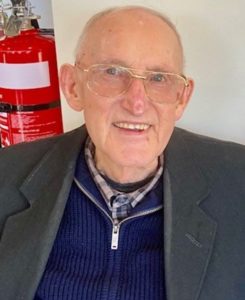
Br Jim Ward.
What are your fondest memories of your time at St Patrick’s College?
Memories! The strong Catholic ethos there both as embracing boys and Brothers; priests also. Close mateships formed there. The sporting life in its many varieties.
Which teacher from your time at SPC had the greatest impact on you? Why?
Br Coyne who was a close teacher having a good sense of humour and relating well with us boys. Some of his religious instruction made a deep impression on me and which I have retained for its strong faith support. It was in his year (Intermediate – Year 10) that I became aware of God’s calling me to be a Brother.
How has your education shaped your professional life?
Seeing how the Brothers lived, as I do suppose, but my decision to ‘join up’ was built on a long time desire to give my life to God and life as a religious teacher seemed to fill the bill!
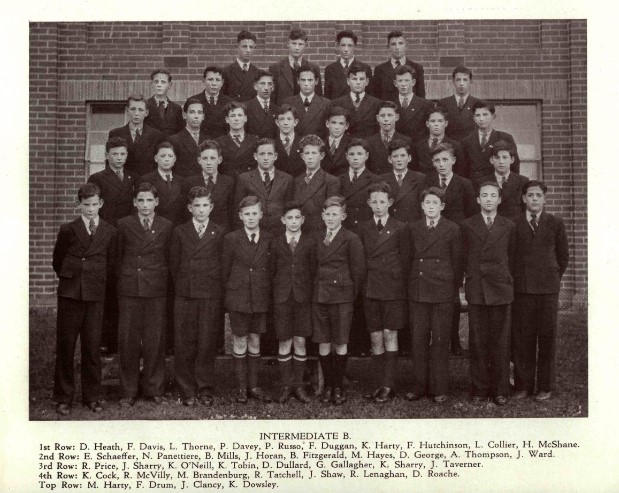
Jim Ward, pictured in his Intermediate B Class photograph in the 1946 College Annual.
How has your time at SPC shaped your personal values and your family life?
Obviously it was a remote educational preparation for life as a teacher.
If you could pass on one message to the students of today, what would it be?
I was in the community of three Brothers with Br George Hewitt, Br Evin Zoch and myself when, in 2012 the Brothers formally finished our 130-year stay. Peter Casey asked me to address the school assembly. I decided I should explain our departing to the boys and suggested that the dominant underlying cause was that universal loss of faith over the previous 60 years of which St Patrick’s was, so to speak, a victim. I pointed out the outstanding differences between the Catholic life at St Pat’s in my time and that of the current time. I was careful to point out that this was none of the boys doing but that they could do something to reverse the tide. So I suggested they say each day the simple prayer: ’Lord increase my faith’. I confidently assured them that, with the daily saying of this simple prayer they would begin to grow in their faith. So there was my ‘message for today’.
Jim also shared a collection of his school-day memories, which he prepared back in 1990. A transcript is published below.
“I was a raw 13-year-old that first night I stepped off the tram, in February 1945, to begin a new life at SPC.
Tagging along with a few other lads, I found myself in the lockers where a robust, rosy faced and somewhat balding man in a black habit welcomed us. This was the famous Br O’Malley (‘Old Bill’ as I quickly learned). His concern for the evidently forlorn new boy immediately showed itself by his giving me a piece of cake to eat, by calling over George Gleeson (Noorat) to take care of me and, in typical Br O’Malley style, announcing to a few fellows “This is Jim Ward and George is being the good Samaritan to him”. I wondered what a good Samaritan actually was! Eventually George led me to Br Mullins’ dormitory where I crept into the last vacant bed and lay there petrified as to what might happen to me before the night was out.
Next day, I found myself in ‘Sub A’ with a mixture of new and old boys, in the same room was Second Year. Br Ray Dowd was our class master. I recall a visitor, probably Br Coyne from next door, coming to see us and Ray asking a series of questions as to how many of us had not done Latin, French, Algebra, Geometry, Science before and after each subject was named, up went a host of hands. The Brothers exchanged looks of mutual despair at these relics of the old merit certificate days. But we battled on proving that sage to be right. Knowledge really doth have a bloody entrance! By Easter I was a pack of nerves and swore to myself I was not coming back. I got home and said not a word to that effect, it was, I suppose, that fact that I knew my mother, especially, had her heart set on all her children getting a good Catholic education and she had made it perfectly clear to me that I was going to St Pat’s to learn my religion.
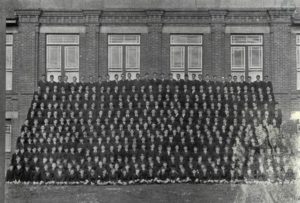
The student cohort of St Patrick’s College, pictured in the 1947 College Annual.
At SPC in those days you absorbed faith as if by a spiritual osmosis. We had Mass five mornings each week and were privileged in so far as all boys joined in the Latin responses; Confessions were a regular part of Friday night program; the day began with morning prayer and ended with rosary on our knees, both in the chapel. We were encouraged to ‘make a visit’ after each meal and large numbers did so. It was not uncommon to see boys praying in the chapel – and some for 10-20 minutes – during the pre-tea wait outside the dining room. I recall Br Dowd expressing feigned astonishment at one misguided boy who thought that a secular subject began at 12 noon. His response ran like: “Don’t you know that in every Christian Brothers’ school anywhere in Australia (or world!), Religion is taught between 12 and 12.30 every day?”. And so it was. I think it was the obvious place that religion had in the hierarchy of values in the Brothers’ lives, along with their prayerfulness, that impressed the priority of faith on our young and plastic minds. Hence we readily accepted and participated in May and June devotions, sodalites, school prayers, Christ the King procession round the oval and retreats. I must admit the Sunday morning chapel talk by Br Healy was not very popular though I have never forgotten how deeply he impressed on us the truth of Christ’s real presence in the Eucharist. Our chaplain was the then young Fr Leo Fiscalini, whom we got to know from his visits to the classrooms. Another familiar and friendly clerical face often seen about St Pat’s was that of Fr Shelley. Every year saw the ordination of one or more Old Boys and their visit to their alma mater was always a major event, accompanied by a half or whole day holiday.
In a word, we were blessed with a faith-filled atmosphere in which to grow as manly young Catholic men.
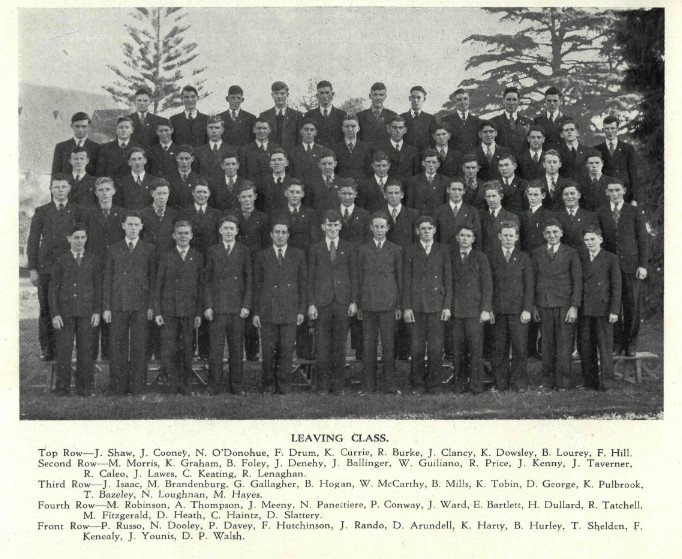
Jim Ward pictured in his 1947 Leaving Class.
It almost goes without saying that in such at atmosphere, an extremely healthy moral tone prevailed. I can honestly say that in my three years at SPC, I was not aware of any serious moral lapses in the College. I remember one boy remarking, after an hour or two’s yarning one cold Sunday afternoon, “It’s great to have a good yarn now and then”, and another “especially when it’s clean”. As far as I know, that was the norm.
I have often said that I found little or no difference between the moral tone of St Pat’s and of St Enda’s, our juniorate. Little wonder, perhaps, that from my class, there were four priests: Frs Dan Arundell, Damien Heath, Bill McCarthy and David (Pat) ‘Duck’ Walsh ss.
And behind all this: those men of prayer and total dedication, the Brothers. How they worked – that was always starkly evident. I suppose we took that for granted as we did the fact that they led us in prayer and we knew how they rose in the cold of the winter, as in all seasons, to head for the chapel. Some more devout boys joined the Brothers at Mass on our Tuesday and Thursday sleep-in mornings, most of us preferring to relish that extra hour’s sleep to await the approaching footsteps and the summonsing clap. After our three hail Mary’s by our bedside, it was down to the lockers in silence, a quick ‘lick and a promise in cold water and off to the chapel for prayer. Br O’Malley supervised lockers with occasioned relief from other Brothers. I think most, if not all Brothers taught all day every day; perhaps the bursar, Br Mullins, and the principal, Br Healy, did get some periods off but it wasn’t obvious. Even as a boy, I felt for Br Mullins as he burnt the midnight oil and was quite astonished at his charity when he told me I should have woken him when I was having trouble sleeping, owing to severe chilblains. Br Dominic Healy’s deep concern for us was impressed on me during a three-week spell in St John’s hospital with a broken leg – the result of a wrestle between races at athletics. He visited me every night. This was third term and I was enjoying my convalescence in the infirmary run by Sister Schaelfer, when that good-natured and most admirable man, Br Bernadine Coyne, finally got me up and going by dint of his persuasive good humour rather than by use of his authority. There was a steel loop under my plaster-covered right leg; this caught the eye of Br Finton McCarthy who realised it must have been jolting my leg as I walked on it so he very kindly took me aside and padded the loop with a rubber shock absorber. I think these incidents typified the concern of the Brothers for us boys.
My own few months of curtailed mobility also brought home to me the spirit of charity among the boys, always considerate and ever ready to be helpful.
St Pat’s boys were a mixture of the ordinary cosmopolitan breed of youth from a huge variety of backgrounds and covering the normal spectrum of talent and character type. It was understood that you belonged to one of the many very or fairly closely-knit groups and that everyone had his special mate or mates. Close and lasting friendships were formed, almost brother-like relationships. This was one of St Pat’s greatest appeals to me and I suppose in this I am simply echoing the ancient experience of adolescents.
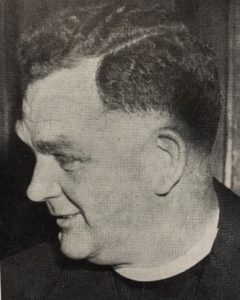
College Principal, Br J.D. Healy.
But it was the ‘genius’ of the environment under the shrewd and practical leadership of Br Healy that ensured the persistent emergence of quality leadership among the boys. And there is no doubt in my mind that I this, as in other aspects of College life, the Holy Spirit was winning in that relentless spiritual warfare St Paul speaks of, as it was waged on each front of the religious, moral, social, scholastic and sporting development of these young Catholic lives.
We were very proud of St Pat’s; perhaps it is fair to say that certainly in football and also in athletics we were fed on a surfeit of success. But boat race day cut us back to size! I suppose we were, sports wise, a huge fish in a little pond those days, though I doubt that many of us actually dwelt on this fact. During footy season it was a Thursday morning ritual to group around the notice board and there to read the time-honoured Br O’Malley “Congratulations and Felicitations St Pat’s”.
I think Br O’Malley was seen to be the personification of the spirit of SPC and, I believe, he was a man universally loved by the boys. One of my fears was that, not being in his famous ‘Inter A’ class, I might pass through St Pat’s without getting “the cuts from Old Bill”. To my immense satisfaction, I averted this dubious disgrace by qualifying one night at night study! Plenty of others used to qualify, too! It would, I’m sure, be a very rare phenomenon, that a boy would bear any or lasting resentment towards Br WT O’Malley. He came across as a man without malice, one for whom every boy was individually important – a sort of College father figure.
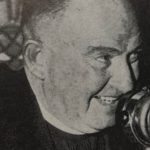
Br Bill O’Malley.
There can not be the slightest doubt that the considerable pride felt in all that those three capitals ‘SPC’ meant to us boys, could, in a generous measure, be attributed to Br O’Malley; it seems that his own self-identification with St Pat’s generated an aura of loyalty that communicated itself to us boys. Of course, it was there in all the Brothers but uniquely in W.T. O’Malley. In those days of examination results by anonymous numbers in the newspaper, there was not the same sense of achievement and inspiration for greater school spirit in the academic field as in the sporting arena and even – when one considers vocations – in the religious aspect of College life. However, I do recall the impression made on me by Br Healy’s somewhat dramatic, certainly surprising, entry into the dining room on one occasion to announce that, of the four scholarships offered by Newman, St Pat’s boys had won two. And I have no doubt that results were very good overall.
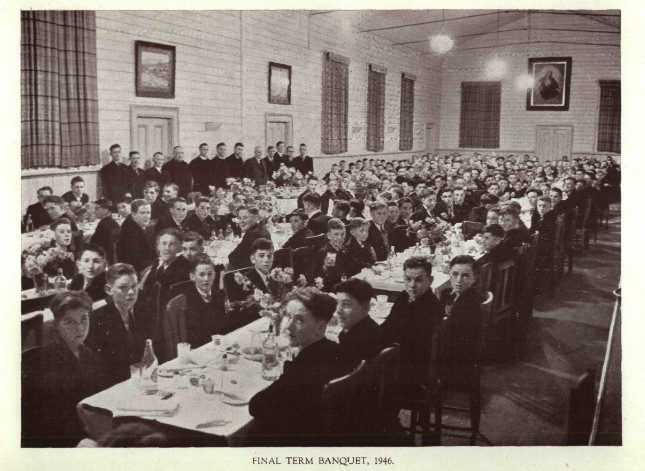
The Final Term Banquet in 1946, published in the 1946 College Annual.
Naturally enough, we boarders had our fair share of grizzles over the concomitant hardships – as we saw them – of boarding school life. For my part, I found that each year I was drawn in and more than compensated by the more joyful and positive sides to boarding life the longer I stayed. One does not forget the rigours of the Ballarat cold or the absence from home or the somewhat Spartan lifestyle of St Pat’s of the forties, but is those other and enliveningly, pleasant memories that thrust themselves more readily on the mind: the camaraderie that was the brightening panacea of all our boyish woes, Saturday night ‘flick’ as we called the movies then being entertained by the magic art of Br Clem Carroll, end-of-term banquets, shouting our teams to sporting victories and participation in our own turn, hours of satisfying recreation on the handball courts, playing ‘real’ handball, delightful afternoons on the athletic field, sunning ourselves on the forbidden ‘hill’, enjoying a Saturday afternoon on the tennis courts or down at the boatshed swimming or taking a pleasure boat out or simply munching a pie with sauce for fourpence on the way home from the corner shop!
And all the while yet another generation of young Catholic men was being moulded and assisted to go worthily from SPC in the footsteps of a long line of College old boys, so many of whom St Pat’s could be so justifiably proud.”

